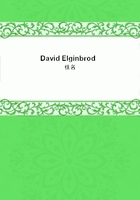
第110章
Darkness is fled: look, infant morn hath drawn Bright silver curtains 'bout the couch of night;And now Aurora's horse trots azure rings, Breathing fair light about the firmament.
Stand; what's that?
JOHN MARSTON.--Second Part of Antonio and Mellida.
When he came to himself, it was with a slow flowing of the tide of consciousness. His head ached. Had he fallen down stairs?--or had he struck his head against some projection, and so stunned himself?
The last he remembered was--standing quite still in the dark, and hearing something. Had he been knocked down? He could not tell.--Where was he? Could the ghost have been all a dream? and this headache be nature's revenge upon last night's wine?--For he lay on the couch in the haunted chamber, and on his bosom lay the book over which he had dropped asleep.
Mingled with all this doubt, there was another. For he remembered that, when consciousness first returned, he felt as if he had seen Euphra's face bending down close over his.--Could it be possible?
Had Euphra herself come to see how he had fared?--The room lay in the grey light of the dawn, but Euphra was nowhere visible. Could she have vanished ashamed through the secret door? Or had she been only a phantasy, a projection outwards of the form that dwelt in his brain; a phenomenon often occurring when the last of sleeping and the first of waking are indistinguishably blended in a vague consciousness?
But if it was so, then the ghost?--what of it? Had not his brain, by the events of the preceding evening, been similarly prepared with regard to it? Was it not more likely, after all, that she too was the offspring of his own imagination--the power that makes images--especially when considered, that she exactly corresponded to the description given by the Bohemian?--But had he not observed many points at which the Count had not even hinted?--Still, it was as natural to expect that an excited imagination should supply the details of a wholly imaginary spectacle, as that, given the idea of Euphra's presence, it should present the detail of her countenance;for the creation of that which is not, belongs as much to the realm of the imagination, as the reproduction of that which is.
It seemed very strange to Hugh himself, that he should be able thus to theorize, before even he had raised himself from the couch on which, perhaps, after all, he had lain without moving, throughout that terrible night, swarming with the horrors of the dead that would not sleep. But the long unconsciousness, in which he had himself visited the regions of death, seemed to have restored him, in spite of his aching head, to perfect mental equilibrium. Or, at least, his brain was quiet enough to let his mind work. Still, he felt very ghastly within. He raised himself on his elbow, and looked into the room. Everything was the same as it had been the night before, only with an altered aspect in the dawn-light. The dawn has a peculiar terror of its own, sometimes perhaps even more real in character, but very different from the terrors of the night and of candle-light. The room looked as if no ghost could have passed through its still old musty atmosphere, so perfectly reposeful did it appear; and yet it seemed as if some umbra, some temporary and now cast-off body of the ghost, must be lying or lingering somewhere about it. He rose, and peeped into the recess where the cabinet stood. Nothing was there but the well remembered carving and blackness. Having once yielded to the impulse, he could not keep from peering every moment, now into one, and now into another of the many hidden corners. The next suggesting itself for examination, was always one he could not see from where he stood:--after all, even in the daylight, there might be some dead thing there--who could tell? But he remained manfully at his post till the sun rose; till bell after bell rang from the turret; till, in short, Funkelstein came to fetch him.
"Good morning, Mr. Sutherland," said he. "How have you slept?""Like a--somnambulist," answered Hugh, choosing the word for its intensity. "I slept so sound that I woke quite early.""I am glad to hear it. But it is nearly time for breakfast, for which ceremony I am myself hardly in trim yet."So saying, Funkelstein turned, and walked away with some precipitation. What occasioned Hugh a little surprise; was, that he did not ask him one question more as to how he had passed the night.
He had, of course, slept in the house, seeing he presented himself in deshabille.